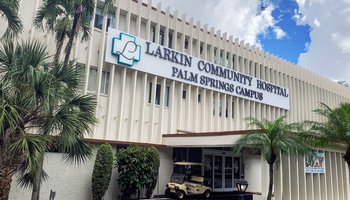
Larkin Hospital Palm Springs
1475 W 49th Pl.. Hialeah, 33012.
Tel: 305-558-2500 | View
Larkin Community Hospital Palm Springs
At Larkin Community Hospital Palm Springs Campus, our dedicated stroke team provides high-quality, evidence-based care to all individuals showing signs and symptoms of stroke.
Our mission is rooted in diligence, ongoing education, and teamwork — ensuring each patient receives compassionate, personalized care for the best possible outcomes.
Understanding stroke is key to prevention, early action, and recovery. At Larkin Community Hospital Palm Springs Campus, we are committed to empowering our community with knowledge.
Stroke is a disease affecting the arteries leading to and within the brain. It is the No. 5 cause of death and a leading cause of disability in the United States.
A stroke happens when a blood vessel carrying oxygen and nutrients to the brain is either blocked by a clot or bursts (ruptures). When this occurs, part of the brain can’t get the blood it needs, and brain cells begin to die.


Blood flow to the brain is temporarily blocked. Also called a “mini-stroke”, TIA, is a major warning sign of a future stroke.
Blocked blood vessels (blood clots) prevent blood flow to the brain causing hypoxia (low supply of oxygen to the brain) and anoxia (no supply of oxygen to the brain).
Occurs when blood vessels in the brain become blocked or clogged (thrombosis). Blood clots are likely to occur when plaque (fat, cholesterol, lipids, etc.) build up in arteries, disrupting natural blood flow (atherosclerosis).
Occurs when blood clots are carried from another part of the body (often the heart) to the small vessels in the brain.
Often caused by Artrial Fibrillation
Rupture of a blood vessel in the brain (hemorrhage). This causes blood to build up creating pressure on the brain and reduces brain cell function.
Comprehensive Stroke Center | Larkin Health Please Visit or Call The Following Facilities.
Physicians Treating Comprehensive Stroke Center | Larkin Health.